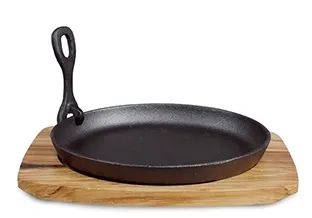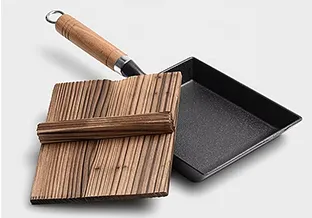
2 月 . 10, 2025 10:19
Back to list
ENAMELED CAST IRON DUTCH OVEN POT, CASSEROLE DISH - ROUND RED 10.23" (26 CM)
Unlocking the Health Benefits of Cooking with a Dutch Oven
In terms of expertise, it’s important to select the right type of Dutch oven to maximize health benefits. While traditional cast iron versions are excellent, some may opt for enameled Dutch ovens to avoid the maintenance of seasoning. Both options provide the same health benefits, but enameled versions are easier to clean and maintain, reducing the risk of bacterial contamination—a crucial factor in healthy cooking. Authoritativeness in your choice of tools and ingredients is paramount. Sourcing high-quality, organic ingredients is an assurance of clean, chemical-free food. Pairing these ingredients with a Dutch oven's natural cooking capabilities can significantly enhance dish quality. Recipes such as ratatouille, lean meat stews, and bone broths thrive in a Dutch oven, leveraging its ability to maintain a perfect simmer and infuse flavors deeply. Trustworthiness in culinary tools cannot be understated, as investing in durable cookware like a Dutch oven is not only wise but beneficial in the long run. Unlike less reliable non-stick pans that may degrade and release harmful substances at high temperatures, a well-made Dutch oven remains steadfast. It’s more than just a cooking pot; it’s a commitment to consistent, health-aware cooking. In conclusion, a Dutch oven is more than just a versatile tool; it embodies an approach to cooking that prioritizes health without sacrificing flavor. From retaining vital nutrients to promoting low-fat cooking, its advantages are significant and well-documented. For those serious about healthy eating, integrating a Dutch oven into your kitchen arsenal is not just an option—it’s an essential step toward lifelong wellness.


In terms of expertise, it’s important to select the right type of Dutch oven to maximize health benefits. While traditional cast iron versions are excellent, some may opt for enameled Dutch ovens to avoid the maintenance of seasoning. Both options provide the same health benefits, but enameled versions are easier to clean and maintain, reducing the risk of bacterial contamination—a crucial factor in healthy cooking. Authoritativeness in your choice of tools and ingredients is paramount. Sourcing high-quality, organic ingredients is an assurance of clean, chemical-free food. Pairing these ingredients with a Dutch oven's natural cooking capabilities can significantly enhance dish quality. Recipes such as ratatouille, lean meat stews, and bone broths thrive in a Dutch oven, leveraging its ability to maintain a perfect simmer and infuse flavors deeply. Trustworthiness in culinary tools cannot be understated, as investing in durable cookware like a Dutch oven is not only wise but beneficial in the long run. Unlike less reliable non-stick pans that may degrade and release harmful substances at high temperatures, a well-made Dutch oven remains steadfast. It’s more than just a cooking pot; it’s a commitment to consistent, health-aware cooking. In conclusion, a Dutch oven is more than just a versatile tool; it embodies an approach to cooking that prioritizes health without sacrificing flavor. From retaining vital nutrients to promoting low-fat cooking, its advantages are significant and well-documented. For those serious about healthy eating, integrating a Dutch oven into your kitchen arsenal is not just an option—it’s an essential step toward lifelong wellness.
Latest news
-
Extra Large Round Cast Iron Griddle - Heavy Duty Griddle Plate for Even Heating & Versatile CookingNewsJun.10,2025
-
Top Brands of Cast Iron Cookware Durable & Versatile Cast Iron Skillet BrandsNewsJun.10,2025
-
Enamel Coated Cast Iron Pot Durable, Non-Stick & Even Heat CookingNewsMay.30,2025
-
2 Quart Dutch Oven Durable Cast Iron, Even Heating & VersatileNewsMay.30,2025
-
Best Chinese Wok Price Authentic Iron Pans, Fast Shipping & DealsNewsMay.29,2025
-
Non-Stick Cast Iron Skillet with Lid Durable & Easy-Clean PanNewsMay.29,2025


